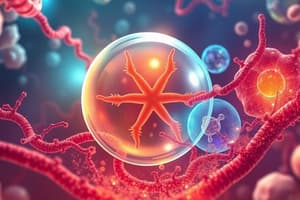Podcast
Questions and Answers
What is the primary function of dermal plant tissues?
What is the primary function of dermal plant tissues?
- Participating in photosynthesis
- Providing protection against environmental factors (correct)
- Transporting water and minerals
- Coordinating responses to stimuli
Which type of animal tissue is responsible for generating movement and maintaining posture?
Which type of animal tissue is responsible for generating movement and maintaining posture?
- Epithelial tissue
- Connective tissue
- Muscle tissue (correct)
- Nervous tissue
What is the main role of nervous tissue in animals?
What is the main role of nervous tissue in animals?
- Coordinating responses to stimuli through electrical impulses (correct)
- Covering surfaces and providing structural support
- Supporting various body parts
- Generating movement and maintaining posture
How do plant ground tissues differ from vascular tissues?
How do plant ground tissues differ from vascular tissues?
What is the main function of epithelial animal tissues?
What is the main function of epithelial animal tissues?
What is the function of the nucleus in a cell?
What is the function of the nucleus in a cell?
What is the main purpose of mitosis in cell biology?
What is the main purpose of mitosis in cell biology?
Why are cell membranes essential for cells?
Why are cell membranes essential for cells?
What is the primary function of metabolic reactions in cells?
What is the primary function of metabolic reactions in cells?
How do cells communicate with each other for tissue formation?
How do cells communicate with each other for tissue formation?
Flashcards are hidden until you start studying
Study Notes
Cell Biology: Unlocking Life's Foundations
Cell biology, a fundamental branch of biology, delves into the intricate structures and functionalities of cells, which are the building blocks of all living organisms. From bacteria to humans, cells serve as the smallest unit capable of performing the essential processes of life. Let's explore some key aspects of cell biology that reveal the complexity and unity underlying life's diversity.
Structure and Components
At the heart of every cell lies a nucleus containing the genetic material encoded in DNA. The cytoplasm surrounds the nucleus, housing various organelles tailored for specific tasks. Membranes control what enters and exits each cell compartment, maintaining internal conditions conducive to life. But cell biology isn't merely concerned with static structures; it also studies dynamic events like mitosis, the process through which cells divide and reproduce their DNA.
Metabolism and Homeostasis
To survive, cells need energy derived mostly from food. During metabolic reactions, nutrients are broken down into simpler molecules while releasing or consuming energy. These processes regulate homeostasis, keeping the internal environment stable despite external changes.
Signal Transduction
Communication between and among cells is critical for coordinating tissue formation and maintaining overall health. Through signal transduction, cells respond to external signals by altering their physiology, gene expression, or both. Such communication ensures proper function across diverse tissues and allows multicellular organisms to grow and develop correctly.
Disease and Therapy
Understanding cellular processes can lead to breakthroughs in medical treatment. For instance, cancer treatments target abnormal cell growth. By studying cell division and genetics, researchers aim to prevent uncontrolled proliferation, thus preventing tumor development.
In summary, cell biology provides a framework for comprehending life at its foundational level. It embodies the interplay of diverse disciplines including molecular biology, genetics, and even physics, forming a holistic view of life's fundamental units. As we delve deeper into cellular processes, our appreciation for the complexity and beauty of biology grows exponentially.
Tissues: Basic Building Blocks of Living Organisms
Tissues in biology refer to groups of specialized cells organized together to perform a specific function. Just as bricks build walls, cells build tissues, and tissues constitute organs. Here are some significant types of tissues and their roles in the bodies of plants and animals alike.
Plant Tissues
Plant tissues comprise three major categories: dermal (epidermis), ground (parenchyma, collenchyma, sclerenchyma), and vascular (xylem, phloem). Each serves distinct purposes:
- Dermal: Providing protection against environmental factors and acting as a barrier.
- Ground: Taking part in photosynthesis, storage, and mechanical support.
- Vascular: Transporting water, minerals, sugars, and hormones throughout the plant.
The epidermis, for example, houses specialized cells called guard cells that regulate stomatal opening and closing, controlling gas exchange between the plant and its surroundings.
Animal Tissues
Similar to plants, animal tissues can broadly be categorized into epithelial, connective, muscle, and nervous tissues:
- Epithelial: Covering surfaces, secretion, absorption, and providing structural support.
- Connective: Supporting, binding, protecting, and insulating various parts of the body.
- Muscle: Contracting to generate movement and maintain posture.
- Nervous: Coordinating responses to stimuli via rapid conduction of electrical impulses.
For instance, skin, made primarily of keratinocytes, forms the outermost layer of epithelium and protects the body from physical injury and infection. Additionally, bones are essentially dense connective tissues composed mainly of collagen fibers embedded in a matrix of calcium salts, providing rigidity and support to the skeletal system.
In essence, tissues simplify the concept of living entities by breaking them down into manageable subunits. Studying tissues sheds light on the inner workings of life, fostering a deeper comprehension of the vast array of biological phenomena observed across the tree of life.
Studying That Suits You
Use AI to generate personalized quizzes and flashcards to suit your learning preferences.




